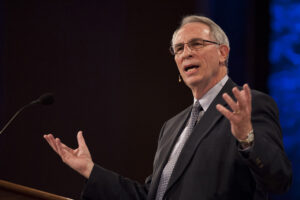
FORT WORTH, Texas (BP)–Most Americans say they do not believe in absolutes because most Americans lie. Or at least they are a little confused.
In a recent poll by the Barna Research Group, two-thirds of Americans said they did not believe in moral absolutes. The poll does not so much reveal a socio-religious shift as much as it exposes the cavernous ignorance necessary to embrace the lie of naturalism.
Naturalism is the belief that this life is basically all there is. The quest of the naturalist, not that far removed from the hedonist, is to base decisions on the here and now, for they believe there is no afterlife.
They also believe that, since humanity is created from nothing, human beings are free to contend that there is a god, but that the thought of a god is basically an emollient contrived to help us deal with the realities of the present age. Thus, the decisions of life should be based on what aids us in the present, and never in response to religion or morality. After all, they believe moral absolutes are human inventions.
It is at this point that Light screams through the porous argument of the naturalist, and the lie is exposed.
The truth is that all of us can find an absolute if pushed. For example, some may quibble over the immorality of sex outside of marriage, but few would quibble over the immorality of sexual abuse. The same one who says that sexual experimentation is fine for adolescents will say that sexual exploitation is wrong — ABSOLUTELY wrong.
This really is a puzzling ideology. How strange that those who condone teenage sexual experimentation will raise awareness against sexual exploitation. Never doubt it; there is an absolute hiding behind that veil of open-mindedness.
I am not suggesting that Americans are lying to pollsters. I am suggesting that Americans are lying to themselves. Toward the goal of living a guiltless life, we have posited that there are no absolutes. As Scripture declares, this worldview itself is a convenient lie that allows me to act on instinct without social, moral or religious responsibility.
Since self-gratification is the goal, the idea of absolutes must be negated, for it threatens my personal right to express myself in whatever way I feel necessary. This then necessitates the elimination, or at least a reinvention, of a divine being. A divine being might come with a divine law, putting limits on my personal freedom. This is why the science of the naturalist is evolution. Without a Creator God, there is no one to which we must be accountable.
Christians, however, understand that we are created in the image of God, an image that God wants to be representative of Himself. It is an image of which we are stewards. It is an image that God will hold us accountable for maintaining.
It is for this reason that we cannot act like animals. It is for this reason that God will hold us accountable. It is for this reason that we must not lie to ourselves about the absolute nature of morality.
One could say that the Barna poll does not reflect a shift, just the natural progression of a culture whose god is pleasure — a progression that reflects how far we will go to protect a most precious national value: the right to sin without consequence.
To this end we will deny moral absolutes, deny the existence of God, and evade responsibility. We will even lie to ourselves, which, of course, is wrong. Absolutely.
–30–
Steven Smith is assistant professor of preaching and holds the James T. Draper Chair of Pastoral Ministry at Southwestern Baptist Theological Seminary in Fort Worth, Texas. He is the son of evangelist and former Southern Baptist Convention President Bailey Smith.















